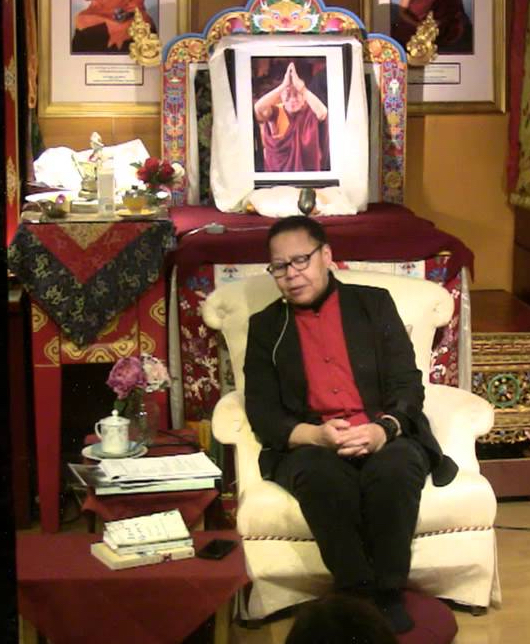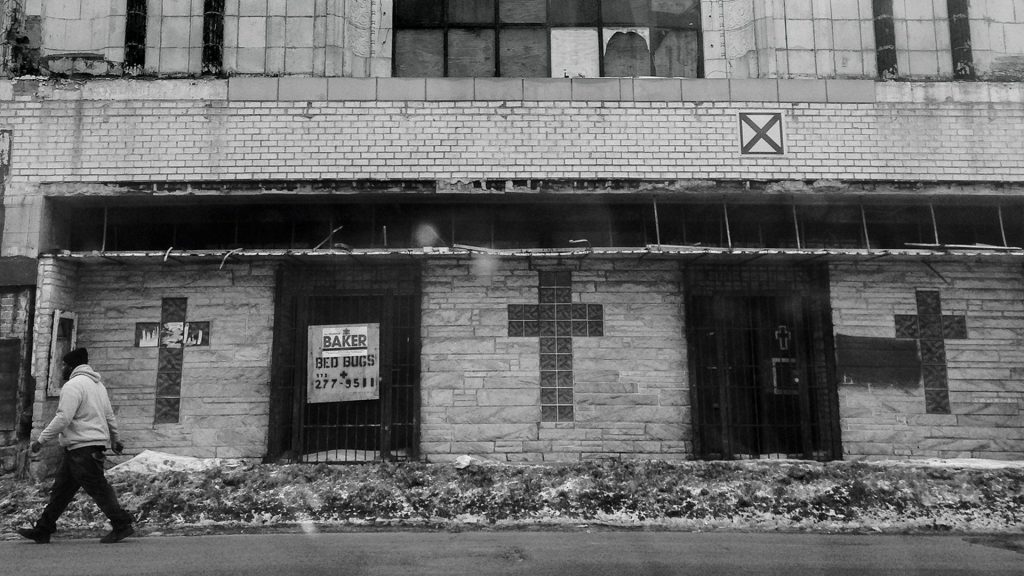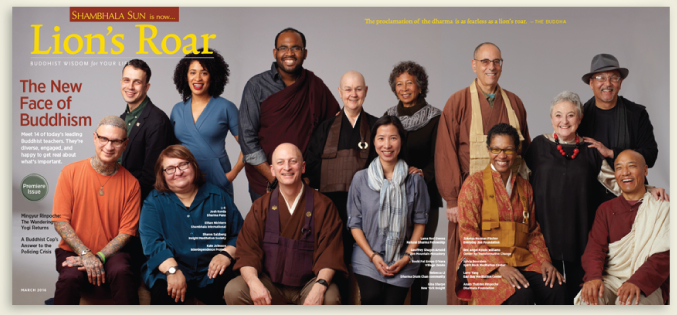Until We Reckon
My “Waking Up White” dharma consult group meets again tonight by Skype. It’s one of more than a dozen such groups (made up of white dharma practitioners) that were formed — entirely voluntarily — as an outgrowth of the work the entire (very diverse) Community Dharma Leader group has been doing to recognize — and undo — the systemic racism we’re all a part of, simply as a result of having lived in this country. The CDL program has had a profound effect on the way I understand my place/role in the world — not just the dharma world — and I think the most dramatic effect has come from the study and discussion work I’ve done in this small “Waking Up White” group.
The materials we have been using were originally put together by a group of practitioners (all white) from the East Bay Sangha in Oakland, CA. They include a wide range of books, articles, videos, etc., but the one that really woke me up was written by Ta-Nehisi Coates, titled: The Case for Reparations. (from The Atlantic magazine, 2015)
From the intro: Two hundred fifty years of slavery. Ninety years of Jim Crow. Sixty years of separate but equal. Thirty-five years of racist housing policy. Until we reckon with our compounding moral debts, America will never be whole.
Reading that article was important. But it was not just reading it that woke me up. It was reading it after also having read and discussed — with a small group of people I felt safe and comfortable with — all the other materials that were provided (beginning with Waking Up White, by Debby Irving) by the East Bay Sangha in Oakland, CA. And it was reading (and discussing) it within a thoughtful set of guidelines and structure.
All of which is now available for use by other peer-facilitated dharma study groups. This is life-changing — world-changing — work. Interested? Email me here.
To Not Tune Out
I want to share this message, which was posted yesterday on the Spirit Rock home page. I want to say that I, too, acknowledge all that is written below, especially the words I have highlighted in bold.
****
A Week of Tragedy
by Phillip Moffitt, Co-Guiding Teacher
We join all of the members of the Spirit Rock community in acknowledging the tragedy of the three shootings that occurred last week (July 3-9, 2016). We offer compassion and support to the families and loved ones of those lost, and to the communities that have been torn apart in anger, fear and grief. So many voices are crying out that this violence must stop, and we add our voice to this plea.
We also acknowledge that for change in attitude and interpretation to occur there needs to be an acknowledgement of the systemic level of institutional racism in our society that leads some police officers to delusional actions based on false perceptions coming from anxiety and fears that have been conditioned into their view of the world. Likewise, we acknowledge that any kind of violent response only gives false validation to the very misperception of seeing others as different and dangerous that is at the root of this tragedy while causing additional suffering. We stand for unity that says all Americans need to be safe in order for any Americans to be truly safe and that all Americans must be recognized in their dignity and lawful rights in order for any Americans to have sustainable dignity and rights.
The Buddha’s teachings begin with the truth that there is suffering, and we have witnessed this truth in Orlando, FL, Falcon Heights, MN, Baton Rouge, LA, Dallas, TX, and in many others places and actions too numerous to name, just in this country alone. The Buddha’s Second Noble Truth is that suffering is caused by the grasping mind that in its delusion and ignorance seeks happiness, safety and stability from things that cannot possibly provide these benefits. The Buddha offers a path to the end of this suffering composed of wise understanding, wise intention, wise speech, wise action and wise mindfulness along with other factors that lead to wisdom and compassion.
In this time of pain and turmoil, it is vital that we utilize our mindfulness and compassion to not tune out, but to stay present, to be willing to be with our anger, grief, fear and sadness.
It is our mindfulness practice that allows us to realize how we too may be inadvertently contributing to the underlying causes of this fear and alienation in our culture. It is our practice of compassion that allows us to see how others like ourselves think, speak and act from ignorance and delusion so that we do not make enemies out of anyone, but rather unite in our efforts to bring change. It is our wisdom that allows us to condemn harmful actions and wrong views without condemning the individuals that experience them. It is our hard-won equanimity that allows us to stay the course and to do our various parts — small and large — to end systemic misunderstanding, prejudice and violence.
May we as a community support one another during this agony, may we stay present for it in loving-kindness such that we can in some small way help relieve suffering.
Hope Grows from Action, Not Thought
 One of the truly inspiring guest teachers at the CDL retreat was Jan Willis, retired Professor of Religion at Wesleyan University and author of Dreaming Me: Black, Baptist, and Buddhist. She talked about growing up in the Jim Crow South, marching with Dr. Martin Luther King, Jr. (whom she calls “that African-American bodhisattva of our time”), and opening to Buddhism as a way to heal the deep wounds of racism. To those who think Activism is not necessarily a part of Buddhism she responds: Activism goes all the way back to when the Buddha first stood up under that Bodhi tree!
One of the truly inspiring guest teachers at the CDL retreat was Jan Willis, retired Professor of Religion at Wesleyan University and author of Dreaming Me: Black, Baptist, and Buddhist. She talked about growing up in the Jim Crow South, marching with Dr. Martin Luther King, Jr. (whom she calls “that African-American bodhisattva of our time”), and opening to Buddhism as a way to heal the deep wounds of racism. To those who think Activism is not necessarily a part of Buddhism she responds: Activism goes all the way back to when the Buddha first stood up under that Bodhi tree!
In Lion’s Roar magazine she writes, “In 1963, as a teenager, I had the good fortune of participating in the ‘Birmingham campaign’ for civil rights led by Reverend King. It was a hopeful time. Feeling part of a larger community of like-minded nonviolent protestors, I felt buoyed up by the possibility of triumph over injustice. When, later, after leaders like Malcolm X, King and the Kennedys had been struck down by violence, a period of hopelessness settled in.
“For many of us today that hopelessness still seems to hold sway. And so, before we endeavor to change the world, we need to rekindle hope again. The thing I’ve learned about hope, however, is that it grows from action, not from thought. If we wish to see an enlightened world of peace and justice for all, we have to move beyond merely imagining it, to nonviolent actions, however small, that will help to usher it in.”
What Love’s Got to Do with It
 Tonight I meet (by Skype) with my White Awake study group. It’s a very thoughtful and surprisingly non-confrontational course of study that looks at Whiteness and Racism and while it covers pretty much what you’d expect, it’s unlike any “diversity training” I’ve ever done before. It’s hard to explain what’s so different about it. Let me just say that it feels like this time the subject is being looked at with love. And it’s having a profound impact on my ease and openness in looking at — and talking about — the many habitual ways that people in a dominant culture tend to ignore/discount/not-see/not-include whatever doesn’t fit into the narrative of that culture.
Tonight I meet (by Skype) with my White Awake study group. It’s a very thoughtful and surprisingly non-confrontational course of study that looks at Whiteness and Racism and while it covers pretty much what you’d expect, it’s unlike any “diversity training” I’ve ever done before. It’s hard to explain what’s so different about it. Let me just say that it feels like this time the subject is being looked at with love. And it’s having a profound impact on my ease and openness in looking at — and talking about — the many habitual ways that people in a dominant culture tend to ignore/discount/not-see/not-include whatever doesn’t fit into the narrative of that culture.
So in honor of this process of waking up, I offer this quote from Maya Angelou:
“I don’t trust people who don’t love themselves and tell me, ‘I love you.’… There is an African saying which is: Be careful when a naked person offers you a shirt.”
Change Is Hard
Not easily, I might add. And not without confrontation, frustration, personal hurt…and even organizational trauma! I was on a conference call last night intended to address these issues with some of the leadership at Spirit Rock and IMS; a large number of fellow Community Dharma Leaders-in-Training (one of whom appears in the photo above!); and the Core Faculty of the next Teacher Training Program, some of whom appear above and all of whom recently resigned over issues of institutional power/privilege and, yes, racism! But that’s for another post.
For now, let’s just take a moment to smile as we look at what truly is The New Face of Buddhism. The photo above is the new, fold-out cover of Shambala Sun magazine, now re-named: Lion’s Roar.
We’ve come a long way, Baby.
But oh how far we have to go.


